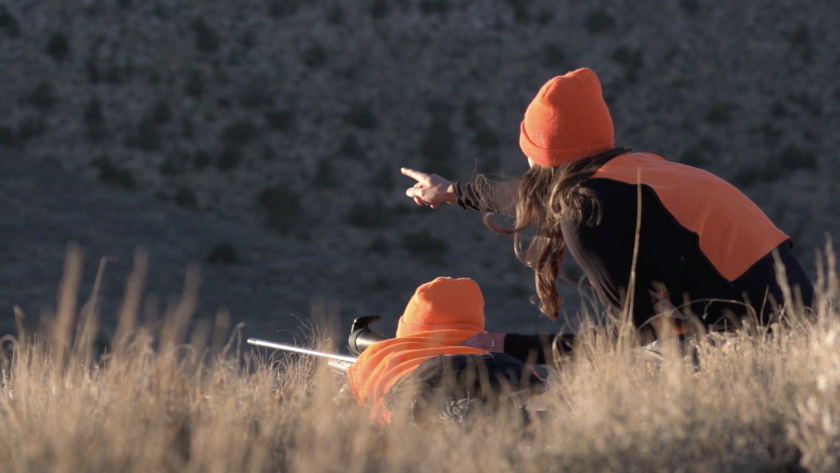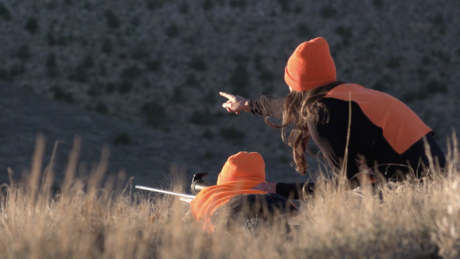Utah officials are suspending fewer hunting, fishing licenses — but going after the worst offenders
DNR officials urge hunters and anglers to know the law before heading out this season. Data shows license suspensions are trending down, but officials say that’s because they’re focused on ‘blatant’ offenders, not those making honest mistakes

Courtesy Utah Division of Wildlife Resources
Hunters look for prey in Utah wild lands.Utah Department of Natural Resources data shows the number of hunting and fishing license suspensions have been trending downward in recent years — but wildlife officials say that’s not because they’re being lenient.
Instead, DNR Sgt. Devin Christensen said it’s because state wildlife officers are focused on “blatant” offenders, rather than Utahns making honest mistakes.
“We’re trying to more vigorously pursue those who blatantly are breaking the law,” he said. “If it’s maybe an accident or a mistake (we’re) trying to give the benefit of the doubt. … We’re trying to be a little bit more understanding and make sure we’re really pursuing those who are blatantly breaking the law.”
Here is a breakdown of hunting and fishing license suspensions in Utah from the last few years, according to DNR:
- 2017: 83
- 2018: 88
- 2019: 84
- 2020: 41
- 2021: 55
- 2022: 77
- 2023: 42
- 2024: 54
- 2025: 35 (so far, mid year)
Christensen said the number of hunting and fishing license suspensions are trending down, but he also noted some license suspensions can span multiple years, depending on the violation’s severity. For example, in 2024, he said those 54 license suspensions totaled 261 years of cumulative suspended years, because suspension terms can range between one to seven years, depending on the offense.
The lengths of various suspensions are established by the Utah Legislature and are based on the designated class of crime:
- For a class C misdemeanor, the suspension is one year.
- For a class B, it’s three years.
- For a class A misdemeanor, it’s five years.
- For a felony, it’s a seven-year suspension.
However, those suspension terms can be doubled for two reasons: if a license was already suspended at the time of a crime or if the crime involved a trophy animal.
Utah is a member state of the Interstate Wildlife Violator Compact. License suspensions in Utah are also recognized in all the other states in the U.S., except for Hawaii.
Egregious violations, Christensen said, are hunters shooting multiple animals they’re not permitted to take, or those trying to hide or sneak an illegal carcass.
However, he said wildlife officials also recognize mistakes happen. For example, maybe a hunter shoots a spike elk, but later discovers it was actually a cow elk. Or maybe an angler catches six rainbow trout before realizing the catch limit at the reservoir was actually four.
If that happens, Christensen urged hunters or anglers to call the DNR and to notify them of the issue rather than trying to ignore or hide it.
“If you make a mistake, call us. We understand. We’ll work with you. We’re not out there to get you,” he said. “That’s our main goal, is to protect the resource and the people out there, to make sure everybody’s safe and we can manage the (protected) species.”
When hunters or anglers are “opportunistic” and knowingly break the law, DNR said in a news release issued this week that “in most of these instances, the person will be criminally prosecuted and will pay a fine.” But for their hunting or fishing license to also be suspended, the person has to “intentionally, knowingly or recklessly violate the law.”
However, DNR Lt. Casey Mickelsen said in a prepared statement that if someone “self-reports a wildlife violation, it often reduces the severity of the punishment and the likelihood that their license will be suspended.”
“We understand that people get scared or embarrassed, but we really appreciate those hunters and anglers who call and tell us about their mishaps,” he said. “This shows a lot of goodwill and says a lot about you if you take responsibility for your actions.”
For those who intentionally break the law, Christensen said DNR relies “very heavily” on the state’s poaching hotline and the public’s tips and observations in the field.
“The entire purpose of wildlife law enforcement is to encourage people to comply with the laws that help manage fish and wildlife species in the state,” Mickelsen said. “Those laws are made to benefit wildlife and the public. We wish that everyone would just comply with the law so that we didn’t have to do suspensions. That is our goal. But unfortunately, people do break the law, and we believe that a license suspension is the best deterrent we have for people who intentionally commit wildlife crimes.”
Mickelsen said the “best way to stay out of trouble” is to make sure you stay up-to-date on current regulations and carefully check your permit before hunting or fishing.
“Every year, our officers encounter hunters who go hunting without even opening their envelope to see what permit they drew,” he said. “They wait to look at their permit until after they have harvested an animal and then finally discover that they hunted in the wrong unit or season, or sometimes for the wrong species entirely. These situations often result in citations and the illegally harvested wildlife being confiscated.”
If you’re planning a fishing trip, DNR officials urge you to make sure you have a current fishing license and take time to read the current fishing guidebook so that you know the requirements for the waterbody you’re visiting. “You should understand which species must be released, what the daily limit is for each species and if bait is allowed at the waterbody where you are fishing,” DNR officials said.
“There are hunting unit boundaries and fish limits for a reason,” Mickelsen said. “These regulations help us manage various wildlife species according to specific management plans and also help us maintain healthy populations for each area or waterbody. If these regulations are not enforced by our officers, the management plans don’t work as well as intended.”
They also urged Utahns to check the Department of Wildlife Resource’s website, including the Utah Hunting and Fishing app, maps to the hunting boundaries and popular fishing spots, and guidebooks that detail the current hunting and fishing laws in Utah.
“If people have additional questions or concerns about a hunting or fishing regulation, they can also call a Utah Division of Wildlife Resources office or contact the Utah Division of Law Enforcement and talk to a conservation officer,” Mickelsen said. “Our officers will be able to assist with any questions from the public.”
Utah News Dispatch is part of States Newsroom, the nation’s largest state-focused nonprofit news organization.



